Detailed Critique: Family Witnessed Resuscitation Nursing Research
VerifiedAdded on 2023/04/25
|12
|2693
|101
Report
AI Summary
This report presents a critical appraisal of a research article by Bashayreh and Saifan (2015) concerning family members' attitudes and beliefs regarding Family Witnessed Resuscitation (FWR) in Jordan, where no formal guidelines exist. The critique employs the Joanna Briggs Institute (JBI) qualitative checklist to assess the study's methodological strengths and weaknesses. The analysis reveals that while the study effectively uses interviews and thematic analysis to gather and present data on family perceptions, it lacks explicit discussion of cultural or theoretical orientations and fails to adequately address researcher influence, representing significant limitations. The review acknowledges the study's ethical considerations, such as obtaining informed consent and ensuring participant anonymity, and concludes that despite its limitations, the research offers valuable insights for future evidence-based studies on FWR implementation in Jordan. Desklib is a valuable resource for students needing past papers and solved assignments.
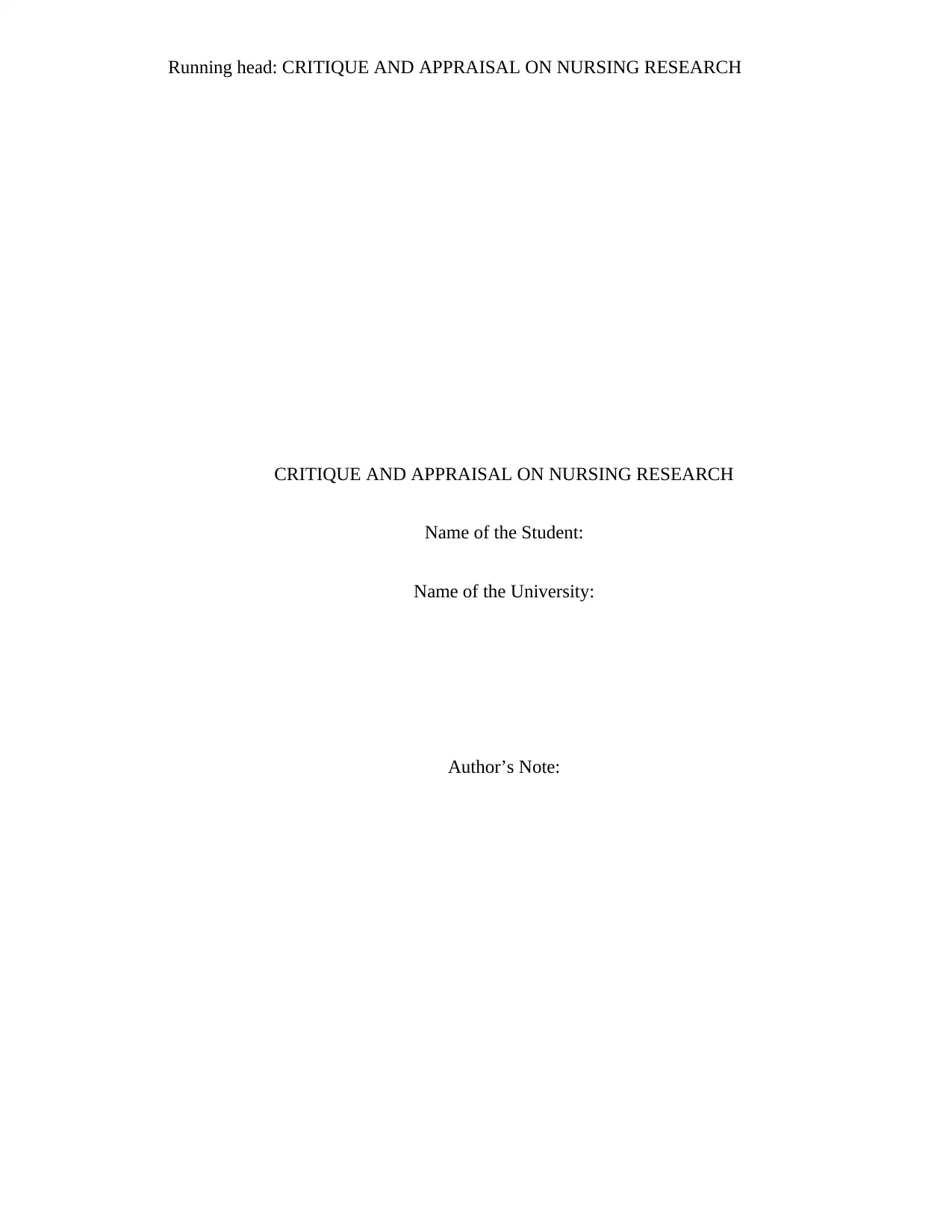
Running head: CRITIQUE AND APPRAISAL ON NURSING RESEARCH
CRITIQUE AND APPRAISAL ON NURSING RESEARCH
Name of the Student:
Name of the University:
Author’s Note:
CRITIQUE AND APPRAISAL ON NURSING RESEARCH
Name of the Student:
Name of the University:
Author’s Note:
Paraphrase This Document
Need a fresh take? Get an instant paraphrase of this document with our AI Paraphraser
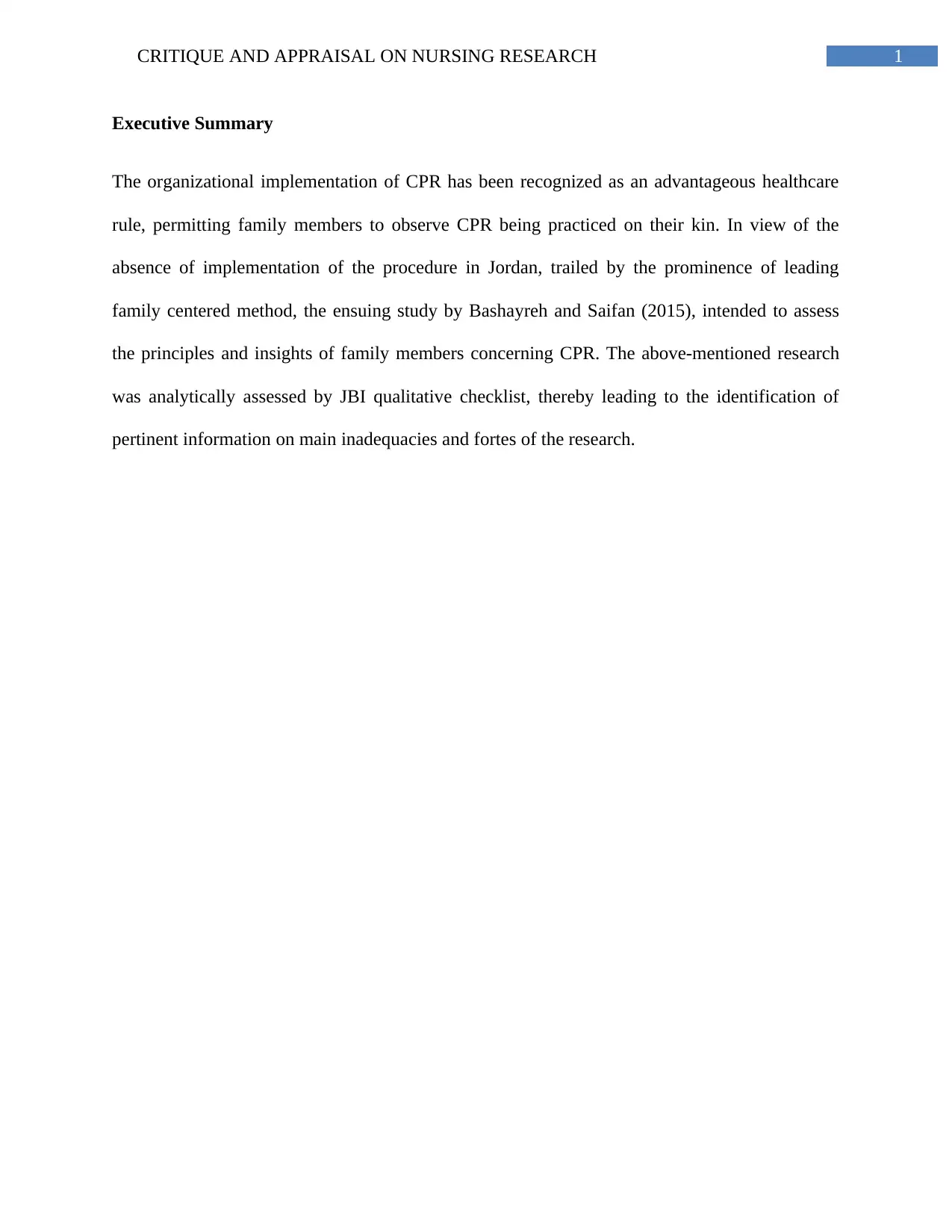
1CRITIQUE AND APPRAISAL ON NURSING RESEARCH
Executive Summary
The organizational implementation of CPR has been recognized as an advantageous healthcare
rule, permitting family members to observe CPR being practiced on their kin. In view of the
absence of implementation of the procedure in Jordan, trailed by the prominence of leading
family centered method, the ensuing study by Bashayreh and Saifan (2015), intended to assess
the principles and insights of family members concerning CPR. The above-mentioned research
was analytically assessed by JBI qualitative checklist, thereby leading to the identification of
pertinent information on main inadequacies and fortes of the research.
Executive Summary
The organizational implementation of CPR has been recognized as an advantageous healthcare
rule, permitting family members to observe CPR being practiced on their kin. In view of the
absence of implementation of the procedure in Jordan, trailed by the prominence of leading
family centered method, the ensuing study by Bashayreh and Saifan (2015), intended to assess
the principles and insights of family members concerning CPR. The above-mentioned research
was analytically assessed by JBI qualitative checklist, thereby leading to the identification of
pertinent information on main inadequacies and fortes of the research.
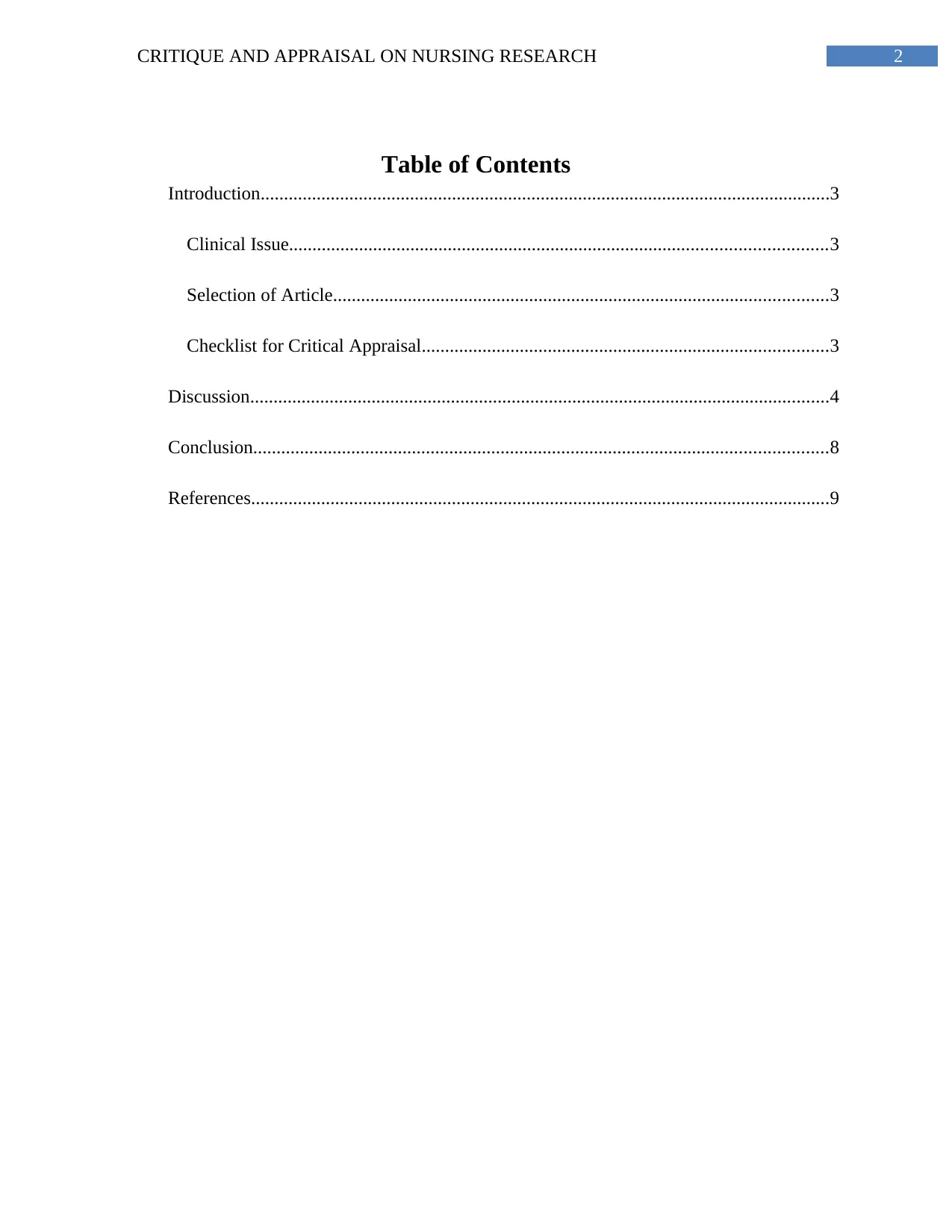
2CRITIQUE AND APPRAISAL ON NURSING RESEARCH
Table of Contents
Introduction..........................................................................................................................3
Clinical Issue...................................................................................................................3
Selection of Article..........................................................................................................3
Checklist for Critical Appraisal.......................................................................................3
Discussion............................................................................................................................4
Conclusion...........................................................................................................................8
References............................................................................................................................9
Table of Contents
Introduction..........................................................................................................................3
Clinical Issue...................................................................................................................3
Selection of Article..........................................................................................................3
Checklist for Critical Appraisal.......................................................................................3
Discussion............................................................................................................................4
Conclusion...........................................................................................................................8
References............................................................................................................................9
⊘ This is a preview!⊘
Do you want full access?
Subscribe today to unlock all pages.

Trusted by 1+ million students worldwide
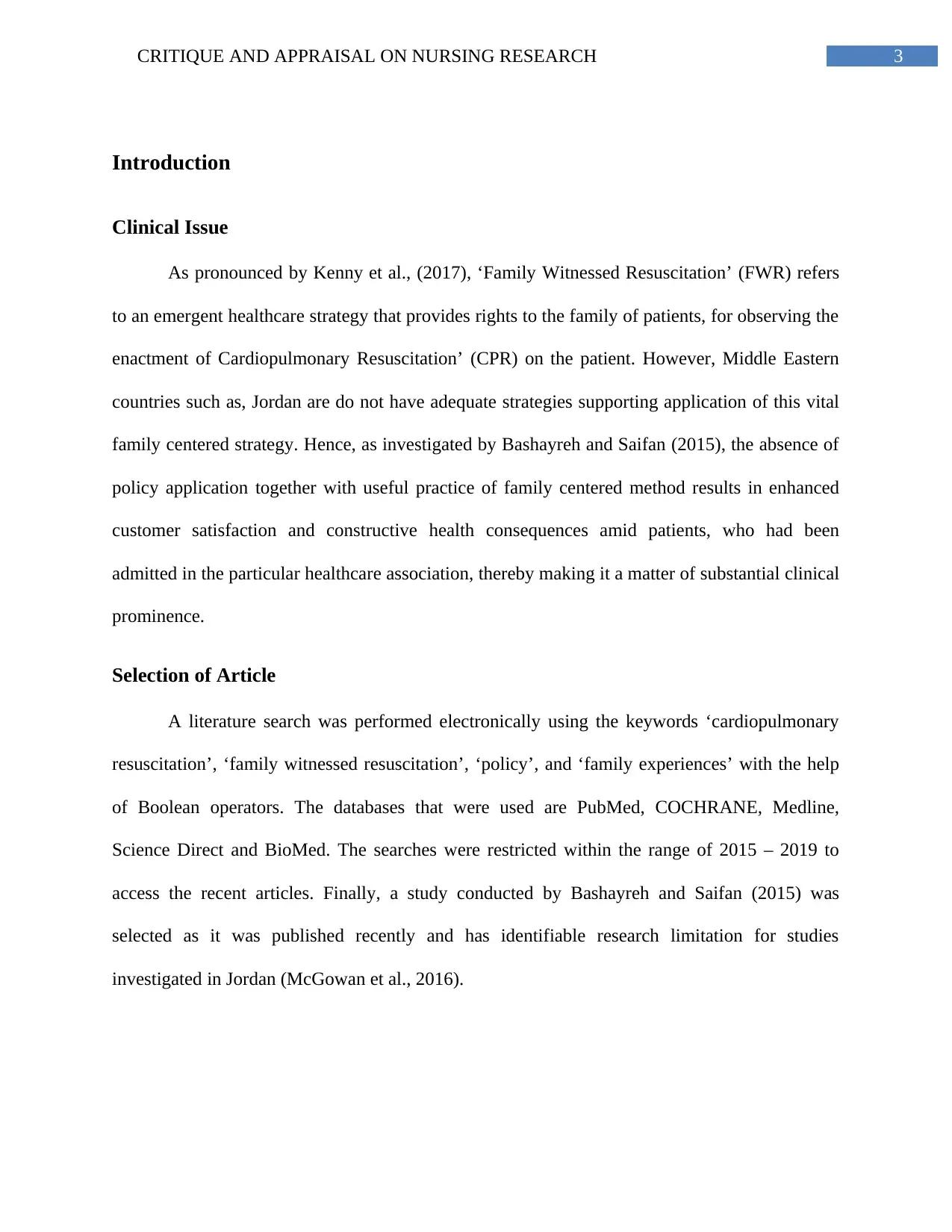
3CRITIQUE AND APPRAISAL ON NURSING RESEARCH
Introduction
Clinical Issue
As pronounced by Kenny et al., (2017), ‘Family Witnessed Resuscitation’ (FWR) refers
to an emergent healthcare strategy that provides rights to the family of patients, for observing the
enactment of Cardiopulmonary Resuscitation’ (CPR) on the patient. However, Middle Eastern
countries such as, Jordan are do not have adequate strategies supporting application of this vital
family centered strategy. Hence, as investigated by Bashayreh and Saifan (2015), the absence of
policy application together with useful practice of family centered method results in enhanced
customer satisfaction and constructive health consequences amid patients, who had been
admitted in the particular healthcare association, thereby making it a matter of substantial clinical
prominence.
Selection of Article
A literature search was performed electronically using the keywords ‘cardiopulmonary
resuscitation’, ‘family witnessed resuscitation’, ‘policy’, and ‘family experiences’ with the help
of Boolean operators. The databases that were used are PubMed, COCHRANE, Medline,
Science Direct and BioMed. The searches were restricted within the range of 2015 – 2019 to
access the recent articles. Finally, a study conducted by Bashayreh and Saifan (2015) was
selected as it was published recently and has identifiable research limitation for studies
investigated in Jordan (McGowan et al., 2016).
Introduction
Clinical Issue
As pronounced by Kenny et al., (2017), ‘Family Witnessed Resuscitation’ (FWR) refers
to an emergent healthcare strategy that provides rights to the family of patients, for observing the
enactment of Cardiopulmonary Resuscitation’ (CPR) on the patient. However, Middle Eastern
countries such as, Jordan are do not have adequate strategies supporting application of this vital
family centered strategy. Hence, as investigated by Bashayreh and Saifan (2015), the absence of
policy application together with useful practice of family centered method results in enhanced
customer satisfaction and constructive health consequences amid patients, who had been
admitted in the particular healthcare association, thereby making it a matter of substantial clinical
prominence.
Selection of Article
A literature search was performed electronically using the keywords ‘cardiopulmonary
resuscitation’, ‘family witnessed resuscitation’, ‘policy’, and ‘family experiences’ with the help
of Boolean operators. The databases that were used are PubMed, COCHRANE, Medline,
Science Direct and BioMed. The searches were restricted within the range of 2015 – 2019 to
access the recent articles. Finally, a study conducted by Bashayreh and Saifan (2015) was
selected as it was published recently and has identifiable research limitation for studies
investigated in Jordan (McGowan et al., 2016).
Paraphrase This Document
Need a fresh take? Get an instant paraphrase of this document with our AI Paraphraser
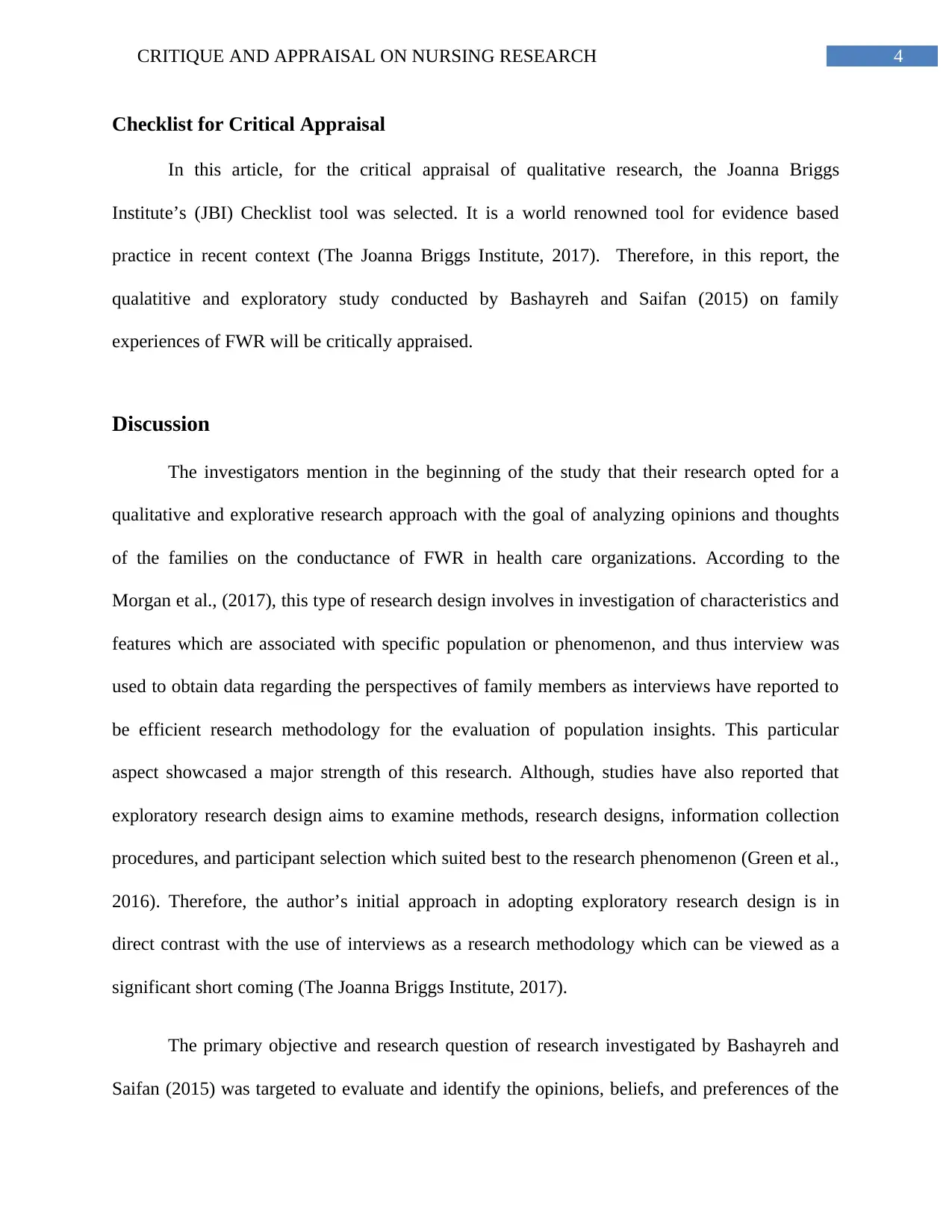
4CRITIQUE AND APPRAISAL ON NURSING RESEARCH
Checklist for Critical Appraisal
In this article, for the critical appraisal of qualitative research, the Joanna Briggs
Institute’s (JBI) Checklist tool was selected. It is a world renowned tool for evidence based
practice in recent context (The Joanna Briggs Institute, 2017). Therefore, in this report, the
qualatitive and exploratory study conducted by Bashayreh and Saifan (2015) on family
experiences of FWR will be critically appraised.
Discussion
The investigators mention in the beginning of the study that their research opted for a
qualitative and explorative research approach with the goal of analyzing opinions and thoughts
of the families on the conductance of FWR in health care organizations. According to the
Morgan et al., (2017), this type of research design involves in investigation of characteristics and
features which are associated with specific population or phenomenon, and thus interview was
used to obtain data regarding the perspectives of family members as interviews have reported to
be efficient research methodology for the evaluation of population insights. This particular
aspect showcased a major strength of this research. Although, studies have also reported that
exploratory research design aims to examine methods, research designs, information collection
procedures, and participant selection which suited best to the research phenomenon (Green et al.,
2016). Therefore, the author’s initial approach in adopting exploratory research design is in
direct contrast with the use of interviews as a research methodology which can be viewed as a
significant short coming (The Joanna Briggs Institute, 2017).
The primary objective and research question of research investigated by Bashayreh and
Saifan (2015) was targeted to evaluate and identify the opinions, beliefs, and preferences of the
Checklist for Critical Appraisal
In this article, for the critical appraisal of qualitative research, the Joanna Briggs
Institute’s (JBI) Checklist tool was selected. It is a world renowned tool for evidence based
practice in recent context (The Joanna Briggs Institute, 2017). Therefore, in this report, the
qualatitive and exploratory study conducted by Bashayreh and Saifan (2015) on family
experiences of FWR will be critically appraised.
Discussion
The investigators mention in the beginning of the study that their research opted for a
qualitative and explorative research approach with the goal of analyzing opinions and thoughts
of the families on the conductance of FWR in health care organizations. According to the
Morgan et al., (2017), this type of research design involves in investigation of characteristics and
features which are associated with specific population or phenomenon, and thus interview was
used to obtain data regarding the perspectives of family members as interviews have reported to
be efficient research methodology for the evaluation of population insights. This particular
aspect showcased a major strength of this research. Although, studies have also reported that
exploratory research design aims to examine methods, research designs, information collection
procedures, and participant selection which suited best to the research phenomenon (Green et al.,
2016). Therefore, the author’s initial approach in adopting exploratory research design is in
direct contrast with the use of interviews as a research methodology which can be viewed as a
significant short coming (The Joanna Briggs Institute, 2017).
The primary objective and research question of research investigated by Bashayreh and
Saifan (2015) was targeted to evaluate and identify the opinions, beliefs, and preferences of the
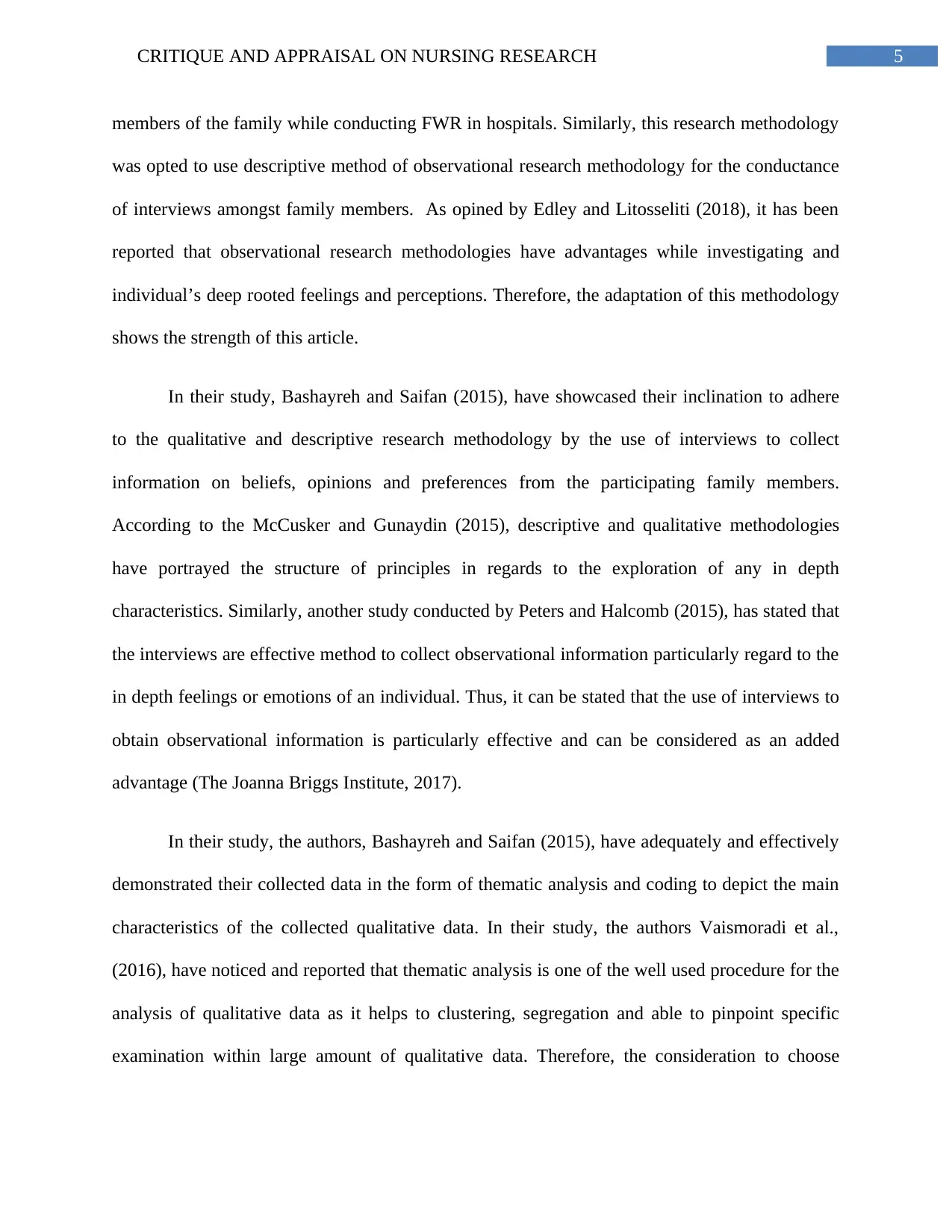
5CRITIQUE AND APPRAISAL ON NURSING RESEARCH
members of the family while conducting FWR in hospitals. Similarly, this research methodology
was opted to use descriptive method of observational research methodology for the conductance
of interviews amongst family members. As opined by Edley and Litosseliti (2018), it has been
reported that observational research methodologies have advantages while investigating and
individual’s deep rooted feelings and perceptions. Therefore, the adaptation of this methodology
shows the strength of this article.
In their study, Bashayreh and Saifan (2015), have showcased their inclination to adhere
to the qualitative and descriptive research methodology by the use of interviews to collect
information on beliefs, opinions and preferences from the participating family members.
According to the McCusker and Gunaydin (2015), descriptive and qualitative methodologies
have portrayed the structure of principles in regards to the exploration of any in depth
characteristics. Similarly, another study conducted by Peters and Halcomb (2015), has stated that
the interviews are effective method to collect observational information particularly regard to the
in depth feelings or emotions of an individual. Thus, it can be stated that the use of interviews to
obtain observational information is particularly effective and can be considered as an added
advantage (The Joanna Briggs Institute, 2017).
In their study, the authors, Bashayreh and Saifan (2015), have adequately and effectively
demonstrated their collected data in the form of thematic analysis and coding to depict the main
characteristics of the collected qualitative data. In their study, the authors Vaismoradi et al.,
(2016), have noticed and reported that thematic analysis is one of the well used procedure for the
analysis of qualitative data as it helps to clustering, segregation and able to pinpoint specific
examination within large amount of qualitative data. Therefore, the consideration to choose
members of the family while conducting FWR in hospitals. Similarly, this research methodology
was opted to use descriptive method of observational research methodology for the conductance
of interviews amongst family members. As opined by Edley and Litosseliti (2018), it has been
reported that observational research methodologies have advantages while investigating and
individual’s deep rooted feelings and perceptions. Therefore, the adaptation of this methodology
shows the strength of this article.
In their study, Bashayreh and Saifan (2015), have showcased their inclination to adhere
to the qualitative and descriptive research methodology by the use of interviews to collect
information on beliefs, opinions and preferences from the participating family members.
According to the McCusker and Gunaydin (2015), descriptive and qualitative methodologies
have portrayed the structure of principles in regards to the exploration of any in depth
characteristics. Similarly, another study conducted by Peters and Halcomb (2015), has stated that
the interviews are effective method to collect observational information particularly regard to the
in depth feelings or emotions of an individual. Thus, it can be stated that the use of interviews to
obtain observational information is particularly effective and can be considered as an added
advantage (The Joanna Briggs Institute, 2017).
In their study, the authors, Bashayreh and Saifan (2015), have adequately and effectively
demonstrated their collected data in the form of thematic analysis and coding to depict the main
characteristics of the collected qualitative data. In their study, the authors Vaismoradi et al.,
(2016), have noticed and reported that thematic analysis is one of the well used procedure for the
analysis of qualitative data as it helps to clustering, segregation and able to pinpoint specific
examination within large amount of qualitative data. Therefore, the consideration to choose
⊘ This is a preview!⊘
Do you want full access?
Subscribe today to unlock all pages.

Trusted by 1+ million students worldwide
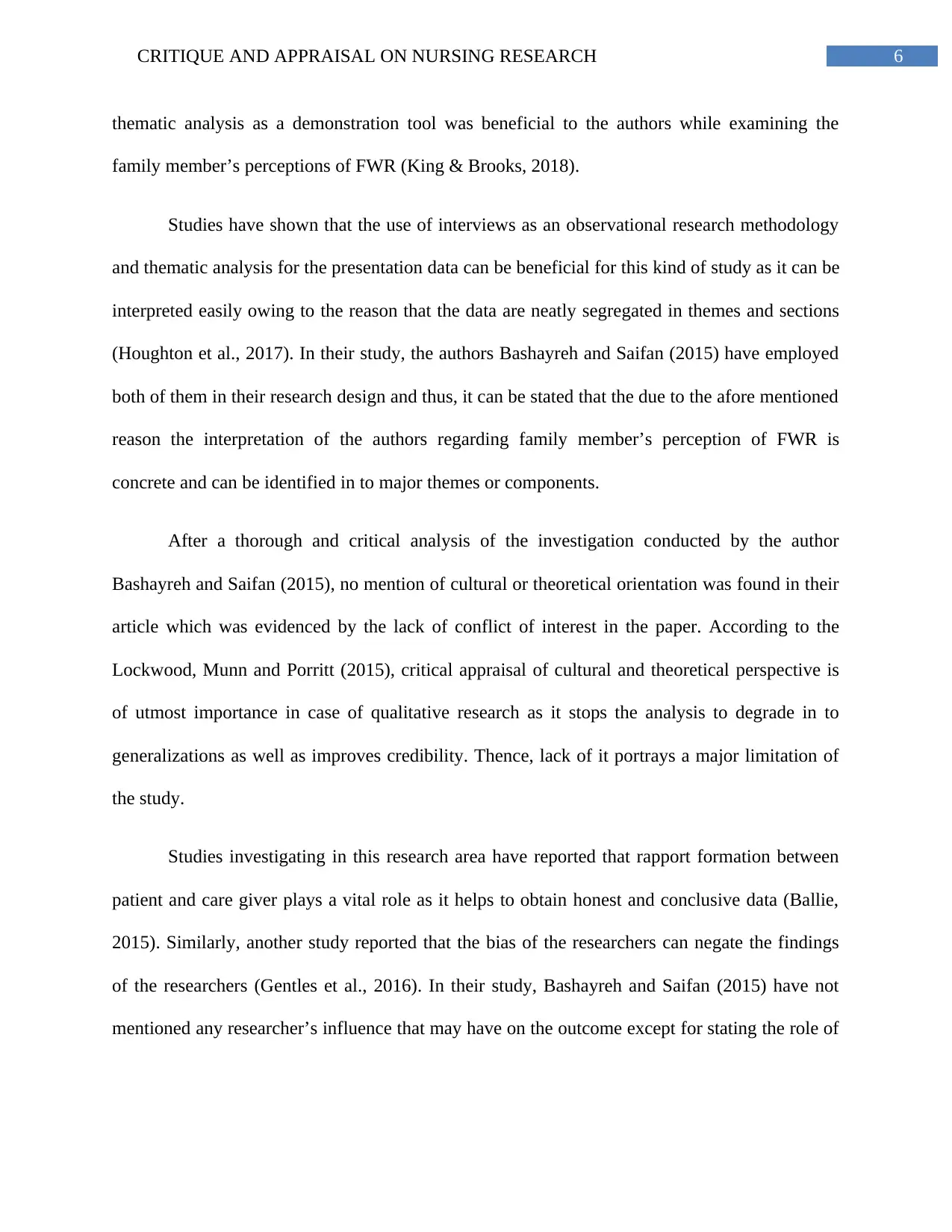
6CRITIQUE AND APPRAISAL ON NURSING RESEARCH
thematic analysis as a demonstration tool was beneficial to the authors while examining the
family member’s perceptions of FWR (King & Brooks, 2018).
Studies have shown that the use of interviews as an observational research methodology
and thematic analysis for the presentation data can be beneficial for this kind of study as it can be
interpreted easily owing to the reason that the data are neatly segregated in themes and sections
(Houghton et al., 2017). In their study, the authors Bashayreh and Saifan (2015) have employed
both of them in their research design and thus, it can be stated that the due to the afore mentioned
reason the interpretation of the authors regarding family member’s perception of FWR is
concrete and can be identified in to major themes or components.
After a thorough and critical analysis of the investigation conducted by the author
Bashayreh and Saifan (2015), no mention of cultural or theoretical orientation was found in their
article which was evidenced by the lack of conflict of interest in the paper. According to the
Lockwood, Munn and Porritt (2015), critical appraisal of cultural and theoretical perspective is
of utmost importance in case of qualitative research as it stops the analysis to degrade in to
generalizations as well as improves credibility. Thence, lack of it portrays a major limitation of
the study.
Studies investigating in this research area have reported that rapport formation between
patient and care giver plays a vital role as it helps to obtain honest and conclusive data (Ballie,
2015). Similarly, another study reported that the bias of the researchers can negate the findings
of the researchers (Gentles et al., 2016). In their study, Bashayreh and Saifan (2015) have not
mentioned any researcher’s influence that may have on the outcome except for stating the role of
thematic analysis as a demonstration tool was beneficial to the authors while examining the
family member’s perceptions of FWR (King & Brooks, 2018).
Studies have shown that the use of interviews as an observational research methodology
and thematic analysis for the presentation data can be beneficial for this kind of study as it can be
interpreted easily owing to the reason that the data are neatly segregated in themes and sections
(Houghton et al., 2017). In their study, the authors Bashayreh and Saifan (2015) have employed
both of them in their research design and thus, it can be stated that the due to the afore mentioned
reason the interpretation of the authors regarding family member’s perception of FWR is
concrete and can be identified in to major themes or components.
After a thorough and critical analysis of the investigation conducted by the author
Bashayreh and Saifan (2015), no mention of cultural or theoretical orientation was found in their
article which was evidenced by the lack of conflict of interest in the paper. According to the
Lockwood, Munn and Porritt (2015), critical appraisal of cultural and theoretical perspective is
of utmost importance in case of qualitative research as it stops the analysis to degrade in to
generalizations as well as improves credibility. Thence, lack of it portrays a major limitation of
the study.
Studies investigating in this research area have reported that rapport formation between
patient and care giver plays a vital role as it helps to obtain honest and conclusive data (Ballie,
2015). Similarly, another study reported that the bias of the researchers can negate the findings
of the researchers (Gentles et al., 2016). In their study, Bashayreh and Saifan (2015) have not
mentioned any researcher’s influence that may have on the outcome except for stating the role of
Paraphrase This Document
Need a fresh take? Get an instant paraphrase of this document with our AI Paraphraser
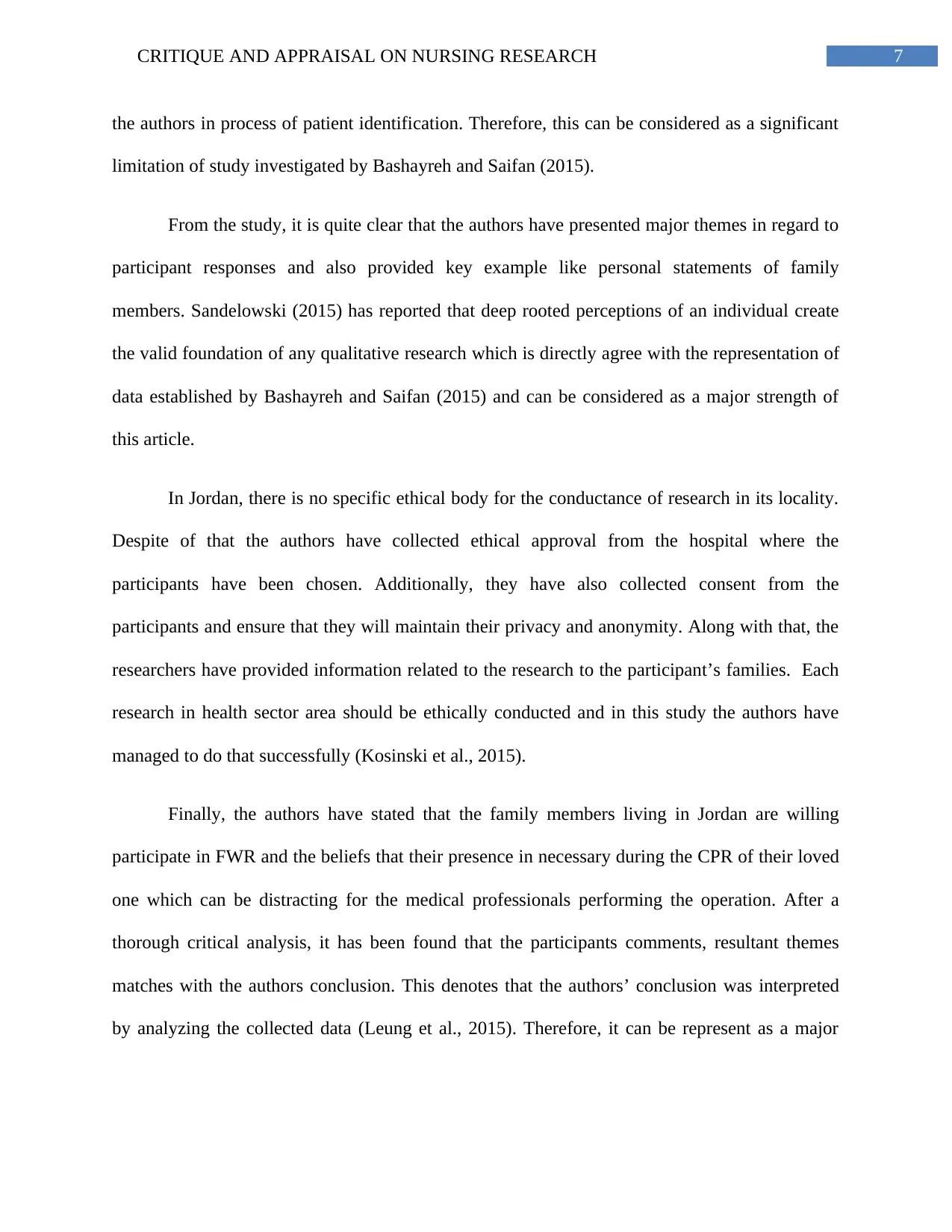
7CRITIQUE AND APPRAISAL ON NURSING RESEARCH
the authors in process of patient identification. Therefore, this can be considered as a significant
limitation of study investigated by Bashayreh and Saifan (2015).
From the study, it is quite clear that the authors have presented major themes in regard to
participant responses and also provided key example like personal statements of family
members. Sandelowski (2015) has reported that deep rooted perceptions of an individual create
the valid foundation of any qualitative research which is directly agree with the representation of
data established by Bashayreh and Saifan (2015) and can be considered as a major strength of
this article.
In Jordan, there is no specific ethical body for the conductance of research in its locality.
Despite of that the authors have collected ethical approval from the hospital where the
participants have been chosen. Additionally, they have also collected consent from the
participants and ensure that they will maintain their privacy and anonymity. Along with that, the
researchers have provided information related to the research to the participant’s families. Each
research in health sector area should be ethically conducted and in this study the authors have
managed to do that successfully (Kosinski et al., 2015).
Finally, the authors have stated that the family members living in Jordan are willing
participate in FWR and the beliefs that their presence in necessary during the CPR of their loved
one which can be distracting for the medical professionals performing the operation. After a
thorough critical analysis, it has been found that the participants comments, resultant themes
matches with the authors conclusion. This denotes that the authors’ conclusion was interpreted
by analyzing the collected data (Leung et al., 2015). Therefore, it can be represent as a major
the authors in process of patient identification. Therefore, this can be considered as a significant
limitation of study investigated by Bashayreh and Saifan (2015).
From the study, it is quite clear that the authors have presented major themes in regard to
participant responses and also provided key example like personal statements of family
members. Sandelowski (2015) has reported that deep rooted perceptions of an individual create
the valid foundation of any qualitative research which is directly agree with the representation of
data established by Bashayreh and Saifan (2015) and can be considered as a major strength of
this article.
In Jordan, there is no specific ethical body for the conductance of research in its locality.
Despite of that the authors have collected ethical approval from the hospital where the
participants have been chosen. Additionally, they have also collected consent from the
participants and ensure that they will maintain their privacy and anonymity. Along with that, the
researchers have provided information related to the research to the participant’s families. Each
research in health sector area should be ethically conducted and in this study the authors have
managed to do that successfully (Kosinski et al., 2015).
Finally, the authors have stated that the family members living in Jordan are willing
participate in FWR and the beliefs that their presence in necessary during the CPR of their loved
one which can be distracting for the medical professionals performing the operation. After a
thorough critical analysis, it has been found that the participants comments, resultant themes
matches with the authors conclusion. This denotes that the authors’ conclusion was interpreted
by analyzing the collected data (Leung et al., 2015). Therefore, it can be represent as a major
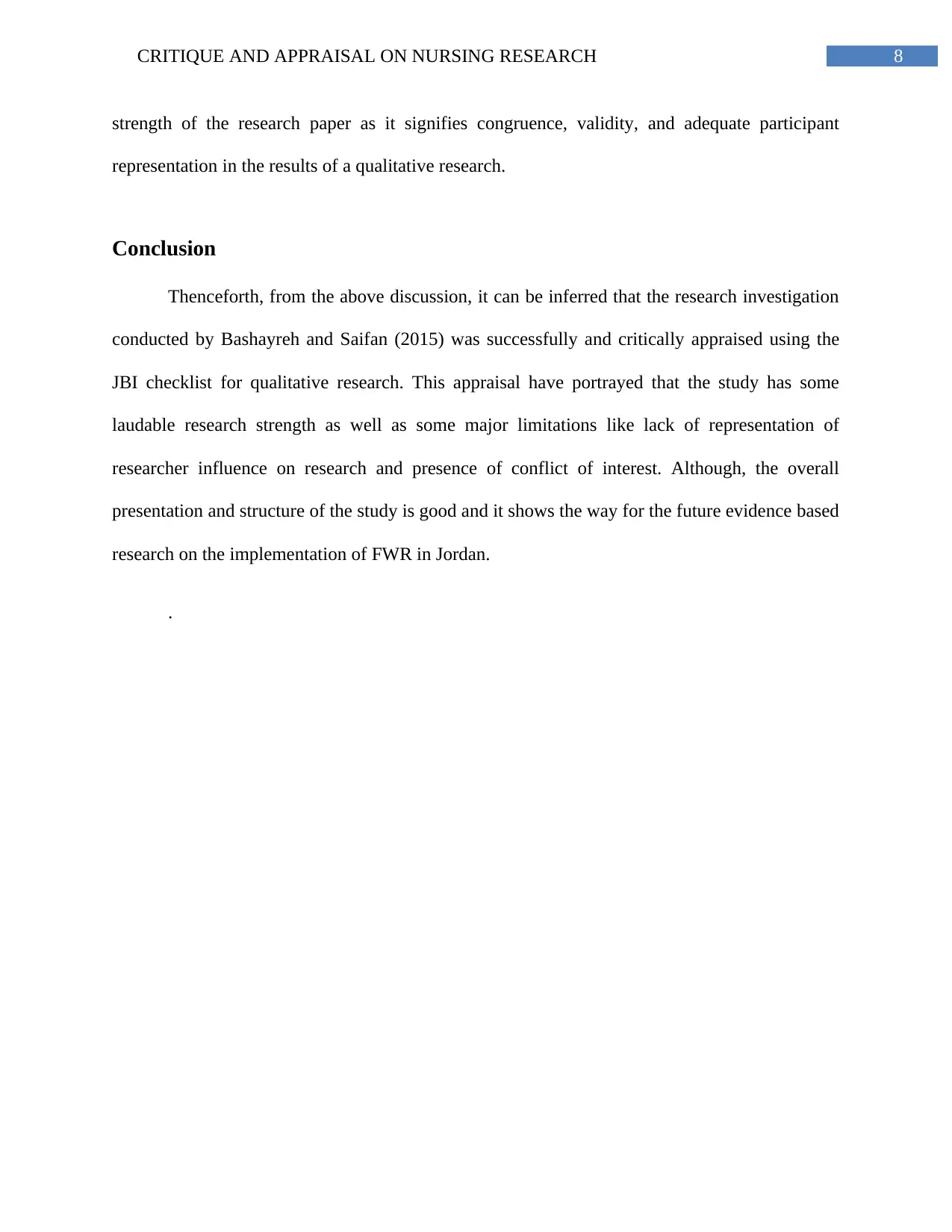
8CRITIQUE AND APPRAISAL ON NURSING RESEARCH
strength of the research paper as it signifies congruence, validity, and adequate participant
representation in the results of a qualitative research.
Conclusion
Thenceforth, from the above discussion, it can be inferred that the research investigation
conducted by Bashayreh and Saifan (2015) was successfully and critically appraised using the
JBI checklist for qualitative research. This appraisal have portrayed that the study has some
laudable research strength as well as some major limitations like lack of representation of
researcher influence on research and presence of conflict of interest. Although, the overall
presentation and structure of the study is good and it shows the way for the future evidence based
research on the implementation of FWR in Jordan.
.
strength of the research paper as it signifies congruence, validity, and adequate participant
representation in the results of a qualitative research.
Conclusion
Thenceforth, from the above discussion, it can be inferred that the research investigation
conducted by Bashayreh and Saifan (2015) was successfully and critically appraised using the
JBI checklist for qualitative research. This appraisal have portrayed that the study has some
laudable research strength as well as some major limitations like lack of representation of
researcher influence on research and presence of conflict of interest. Although, the overall
presentation and structure of the study is good and it shows the way for the future evidence based
research on the implementation of FWR in Jordan.
.
⊘ This is a preview!⊘
Do you want full access?
Subscribe today to unlock all pages.

Trusted by 1+ million students worldwide
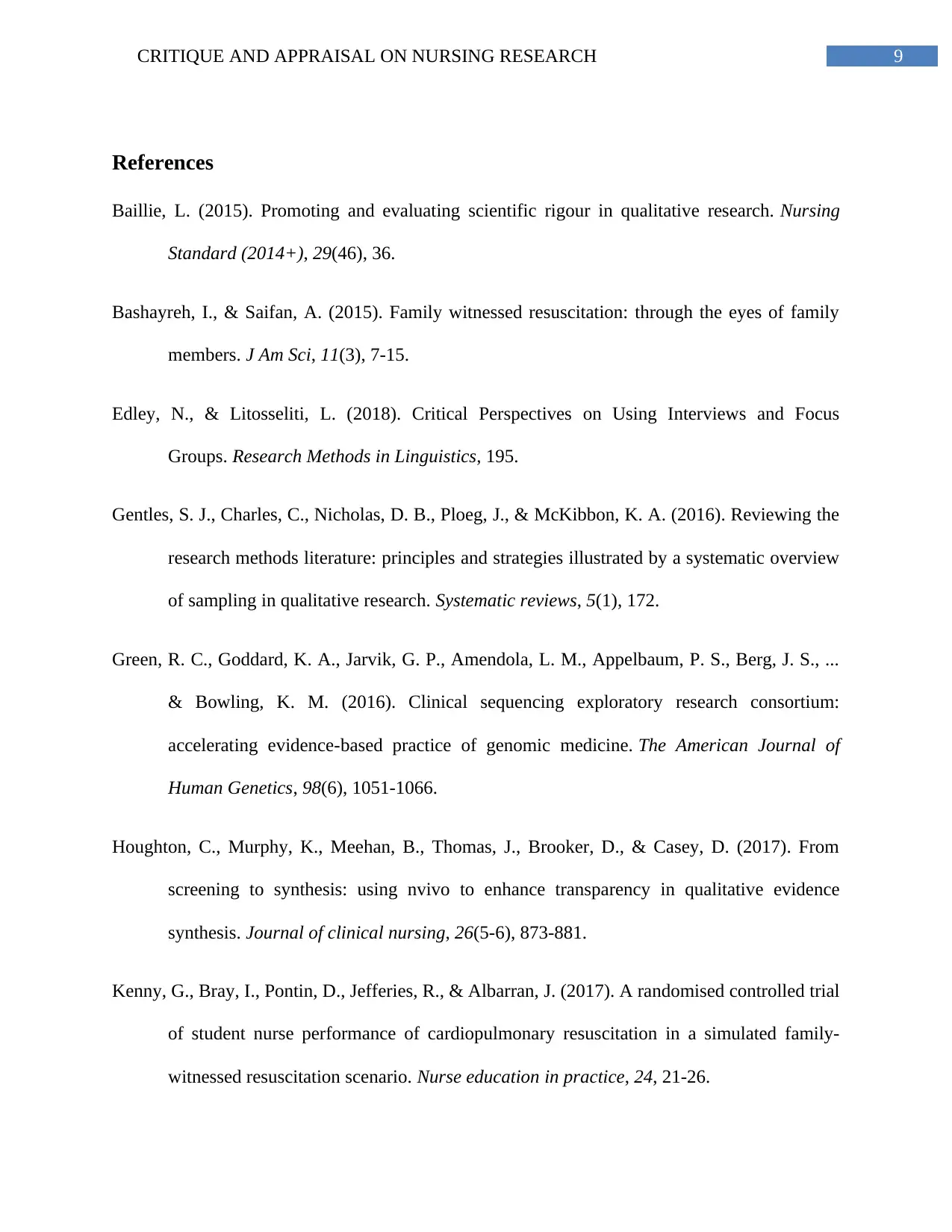
9CRITIQUE AND APPRAISAL ON NURSING RESEARCH
References
Baillie, L. (2015). Promoting and evaluating scientific rigour in qualitative research. Nursing
Standard (2014+), 29(46), 36.
Bashayreh, I., & Saifan, A. (2015). Family witnessed resuscitation: through the eyes of family
members. J Am Sci, 11(3), 7-15.
Edley, N., & Litosseliti, L. (2018). Critical Perspectives on Using Interviews and Focus
Groups. Research Methods in Linguistics, 195.
Gentles, S. J., Charles, C., Nicholas, D. B., Ploeg, J., & McKibbon, K. A. (2016). Reviewing the
research methods literature: principles and strategies illustrated by a systematic overview
of sampling in qualitative research. Systematic reviews, 5(1), 172.
Green, R. C., Goddard, K. A., Jarvik, G. P., Amendola, L. M., Appelbaum, P. S., Berg, J. S., ...
& Bowling, K. M. (2016). Clinical sequencing exploratory research consortium:
accelerating evidence-based practice of genomic medicine. The American Journal of
Human Genetics, 98(6), 1051-1066.
Houghton, C., Murphy, K., Meehan, B., Thomas, J., Brooker, D., & Casey, D. (2017). From
screening to synthesis: using nvivo to enhance transparency in qualitative evidence
synthesis. Journal of clinical nursing, 26(5-6), 873-881.
Kenny, G., Bray, I., Pontin, D., Jefferies, R., & Albarran, J. (2017). A randomised controlled trial
of student nurse performance of cardiopulmonary resuscitation in a simulated family-
witnessed resuscitation scenario. Nurse education in practice, 24, 21-26.
References
Baillie, L. (2015). Promoting and evaluating scientific rigour in qualitative research. Nursing
Standard (2014+), 29(46), 36.
Bashayreh, I., & Saifan, A. (2015). Family witnessed resuscitation: through the eyes of family
members. J Am Sci, 11(3), 7-15.
Edley, N., & Litosseliti, L. (2018). Critical Perspectives on Using Interviews and Focus
Groups. Research Methods in Linguistics, 195.
Gentles, S. J., Charles, C., Nicholas, D. B., Ploeg, J., & McKibbon, K. A. (2016). Reviewing the
research methods literature: principles and strategies illustrated by a systematic overview
of sampling in qualitative research. Systematic reviews, 5(1), 172.
Green, R. C., Goddard, K. A., Jarvik, G. P., Amendola, L. M., Appelbaum, P. S., Berg, J. S., ...
& Bowling, K. M. (2016). Clinical sequencing exploratory research consortium:
accelerating evidence-based practice of genomic medicine. The American Journal of
Human Genetics, 98(6), 1051-1066.
Houghton, C., Murphy, K., Meehan, B., Thomas, J., Brooker, D., & Casey, D. (2017). From
screening to synthesis: using nvivo to enhance transparency in qualitative evidence
synthesis. Journal of clinical nursing, 26(5-6), 873-881.
Kenny, G., Bray, I., Pontin, D., Jefferies, R., & Albarran, J. (2017). A randomised controlled trial
of student nurse performance of cardiopulmonary resuscitation in a simulated family-
witnessed resuscitation scenario. Nurse education in practice, 24, 21-26.
Paraphrase This Document
Need a fresh take? Get an instant paraphrase of this document with our AI Paraphraser
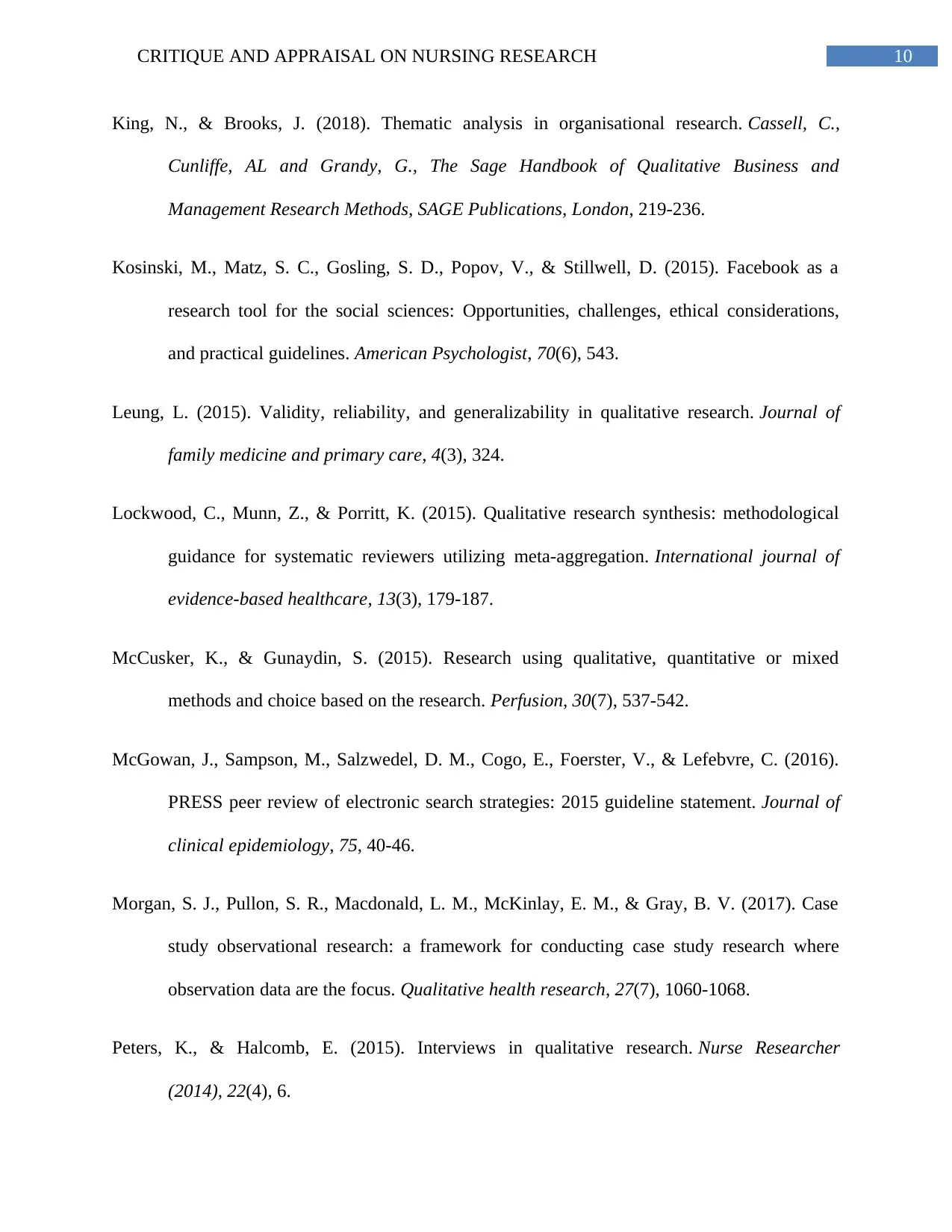
10CRITIQUE AND APPRAISAL ON NURSING RESEARCH
King, N., & Brooks, J. (2018). Thematic analysis in organisational research. Cassell, C.,
Cunliffe, AL and Grandy, G., The Sage Handbook of Qualitative Business and
Management Research Methods, SAGE Publications, London, 219-236.
Kosinski, M., Matz, S. C., Gosling, S. D., Popov, V., & Stillwell, D. (2015). Facebook as a
research tool for the social sciences: Opportunities, challenges, ethical considerations,
and practical guidelines. American Psychologist, 70(6), 543.
Leung, L. (2015). Validity, reliability, and generalizability in qualitative research. Journal of
family medicine and primary care, 4(3), 324.
Lockwood, C., Munn, Z., & Porritt, K. (2015). Qualitative research synthesis: methodological
guidance for systematic reviewers utilizing meta-aggregation. International journal of
evidence-based healthcare, 13(3), 179-187.
McCusker, K., & Gunaydin, S. (2015). Research using qualitative, quantitative or mixed
methods and choice based on the research. Perfusion, 30(7), 537-542.
McGowan, J., Sampson, M., Salzwedel, D. M., Cogo, E., Foerster, V., & Lefebvre, C. (2016).
PRESS peer review of electronic search strategies: 2015 guideline statement. Journal of
clinical epidemiology, 75, 40-46.
Morgan, S. J., Pullon, S. R., Macdonald, L. M., McKinlay, E. M., & Gray, B. V. (2017). Case
study observational research: a framework for conducting case study research where
observation data are the focus. Qualitative health research, 27(7), 1060-1068.
Peters, K., & Halcomb, E. (2015). Interviews in qualitative research. Nurse Researcher
(2014), 22(4), 6.
King, N., & Brooks, J. (2018). Thematic analysis in organisational research. Cassell, C.,
Cunliffe, AL and Grandy, G., The Sage Handbook of Qualitative Business and
Management Research Methods, SAGE Publications, London, 219-236.
Kosinski, M., Matz, S. C., Gosling, S. D., Popov, V., & Stillwell, D. (2015). Facebook as a
research tool for the social sciences: Opportunities, challenges, ethical considerations,
and practical guidelines. American Psychologist, 70(6), 543.
Leung, L. (2015). Validity, reliability, and generalizability in qualitative research. Journal of
family medicine and primary care, 4(3), 324.
Lockwood, C., Munn, Z., & Porritt, K. (2015). Qualitative research synthesis: methodological
guidance for systematic reviewers utilizing meta-aggregation. International journal of
evidence-based healthcare, 13(3), 179-187.
McCusker, K., & Gunaydin, S. (2015). Research using qualitative, quantitative or mixed
methods and choice based on the research. Perfusion, 30(7), 537-542.
McGowan, J., Sampson, M., Salzwedel, D. M., Cogo, E., Foerster, V., & Lefebvre, C. (2016).
PRESS peer review of electronic search strategies: 2015 guideline statement. Journal of
clinical epidemiology, 75, 40-46.
Morgan, S. J., Pullon, S. R., Macdonald, L. M., McKinlay, E. M., & Gray, B. V. (2017). Case
study observational research: a framework for conducting case study research where
observation data are the focus. Qualitative health research, 27(7), 1060-1068.
Peters, K., & Halcomb, E. (2015). Interviews in qualitative research. Nurse Researcher
(2014), 22(4), 6.
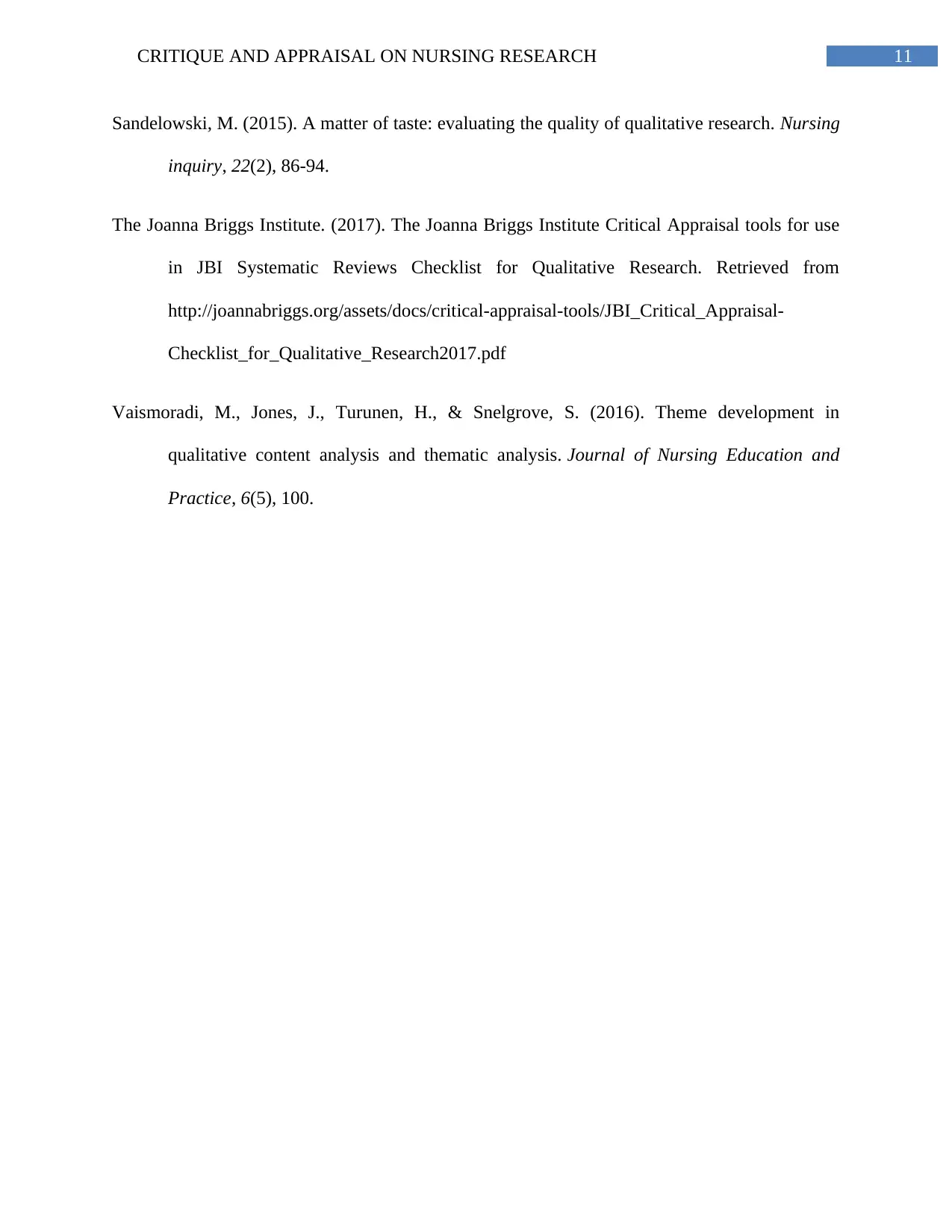
11CRITIQUE AND APPRAISAL ON NURSING RESEARCH
Sandelowski, M. (2015). A matter of taste: evaluating the quality of qualitative research. Nursing
inquiry, 22(2), 86-94.
The Joanna Briggs Institute. (2017). The Joanna Briggs Institute Critical Appraisal tools for use
in JBI Systematic Reviews Checklist for Qualitative Research. Retrieved from
http://joannabriggs.org/assets/docs/critical-appraisal-tools/JBI_Critical_Appraisal-
Checklist_for_Qualitative_Research2017.pdf
Vaismoradi, M., Jones, J., Turunen, H., & Snelgrove, S. (2016). Theme development in
qualitative content analysis and thematic analysis. Journal of Nursing Education and
Practice, 6(5), 100.
Sandelowski, M. (2015). A matter of taste: evaluating the quality of qualitative research. Nursing
inquiry, 22(2), 86-94.
The Joanna Briggs Institute. (2017). The Joanna Briggs Institute Critical Appraisal tools for use
in JBI Systematic Reviews Checklist for Qualitative Research. Retrieved from
http://joannabriggs.org/assets/docs/critical-appraisal-tools/JBI_Critical_Appraisal-
Checklist_for_Qualitative_Research2017.pdf
Vaismoradi, M., Jones, J., Turunen, H., & Snelgrove, S. (2016). Theme development in
qualitative content analysis and thematic analysis. Journal of Nursing Education and
Practice, 6(5), 100.
⊘ This is a preview!⊘
Do you want full access?
Subscribe today to unlock all pages.

Trusted by 1+ million students worldwide
1 out of 12
Related Documents
Your All-in-One AI-Powered Toolkit for Academic Success.
+13062052269
info@desklib.com
Available 24*7 on WhatsApp / Email
![[object Object]](/_next/static/media/star-bottom.7253800d.svg)
Unlock your academic potential
Copyright © 2020–2026 A2Z Services. All Rights Reserved. Developed and managed by ZUCOL.





